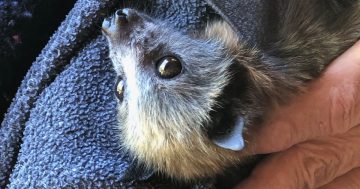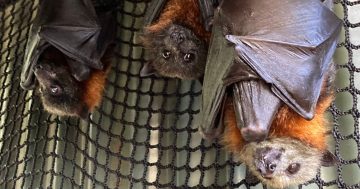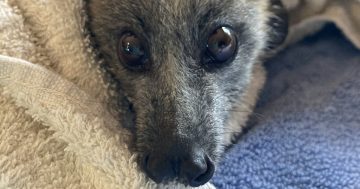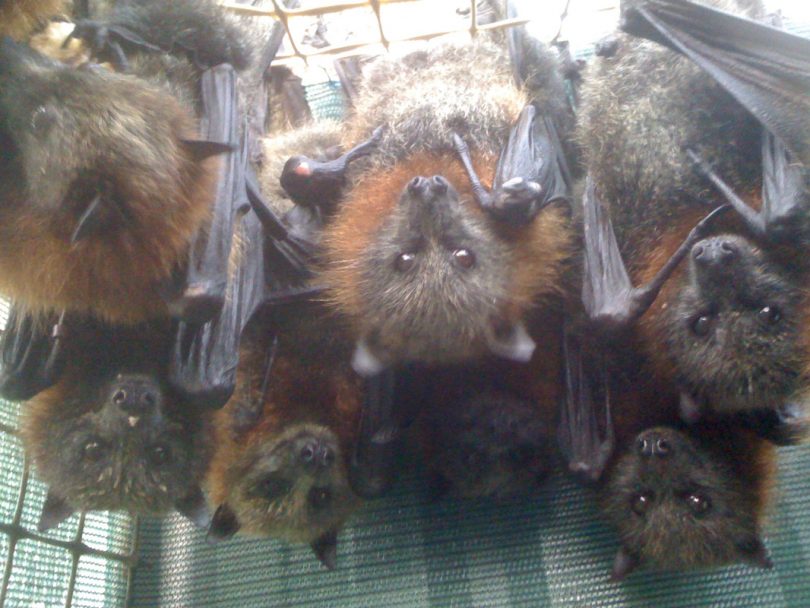
Bats have been heavily impacted by the hailstorm in Canberra. Photo: ACT Wildlife.
As yesterday’s hailstorm cut a swathe through parts of Canberra, the damage to wildlife is only just becoming apparent, with large numbers of injured birds, bats and other wildlife being taken to vets and animal welfare shelters.
While conducting a “run-of-the-mill” rescue of a bat from fruit tree netting, ACT Wildlife president Marg Peachey said hundreds of birds, bats and some possums had been injured or killed by the hailstorm.
Ms Peachey said volunteers from the group had found 322 bats that had died or needed to be euthanised after the storm.
“We spent a lot of yesterday (20 January) at Commonwealth Park where there were hundreds of bats that needed to be euthanised or were already dead,” Ms Peachey said.
“Some of our volunteers took bats home but there are more that will have to be euthanised which is just terrible.
“A lot of the bats hit the ground as they had grabbed onto small branches. The injuries were pretty horrific, with major bones that were snapped.”
Dead or dying birds were found on the ANU campus, along with their resident ducks which were felled by the ferocious hail. Lots of dead seagulls were also sighted at Regatta Point near Commonwealth Park.
Veterinary clinics and Canberra’s Animal Referral Hospital at Fyshwick reported a large variety of birds being handed over by concerned residents.
Specialist veterinary surgeon with the Animal Referral Hospital Jacob Michelsen said they had received more than 60 injured birds after the storm.
“We’ve been seeing all different species – a lot of cockatoos, corellas, galahs, a couple of magpies, peewees, pidgeons – a bit of everything really,” Mr Michelsen said.
“Probably a quarter to a third were salvageable and the rest had to be put down as they had broken limbs, head concussions or broken wings.
“We’ve had another dozen or more animals come through today and we’ll probably get a few more over the next few days as people find injured animals around the place.
“We will assess the animals and try and get them back on their feet, but if they are highly damaged there is no other option but to euthanase the animal.”
Mr Michelsen also held fears for many of the smaller birds that wouldn’t have stood a chance against hail the size of golf balls.
“I wonder about the little birds that got hit and killed. The bigger guys could probably withstand the injuries more, but you get a little shrub wren that gets hit by a golf ball at 100 km/h, that’s kind of the end of them.”
Mr Michelsen said the bat population would need to be carefully managed after much of its habitat had already been lost due to drought and lack of flowering trees.
“The bats have had a tough couple of years which is sad because they are actually very smart animals. They are probably as clever as a dog,” he said.
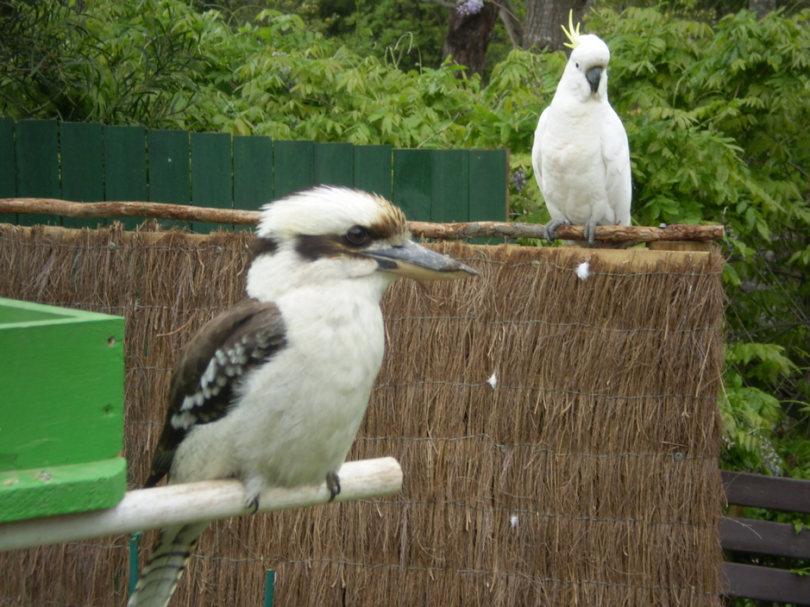
Bigger birds had a better chance of survival in the hailstorm. Photo: Supplied.
A spokesperson for the National Capital Authority warned people not to handle an injured or dead flying-fox as they carry the dangerous disease, lyssavirus, which can be transferred to humans.
Veterinary clinics in Canberra were also urging people to call ahead before bringing animals in as some clinics were reaching or were at capacity after being inundated with injured wildlife.
The Belconnen Animal Hospital has reported more than 35 birds being handed in for treatment.
“A number of injured animals have been reported. If you find an injured animal, if possible please wrap it up in a towel or top and take it to your local vet for treatment,” the spokesperson said.
Mulligans Flat Woodland Sanctuary said it was thankful to be spared by yesterday’s dangerous weather. “Our hearts go out to those who were less lucky,” the Sanctuary said via social media.
Marg Peachey said if people wanted to help, the best way was to make a monetary donation to ACT Wildlife.
“An adult bat eats 500 grams of fruit a day so it’s going to be expensive to keep them alive, so money allows us to spend it when we need it, rather than deal with a large amount of fruit which goes off before we can use it,” she said.
Donations to ACT Wildlife can be made via its website.












